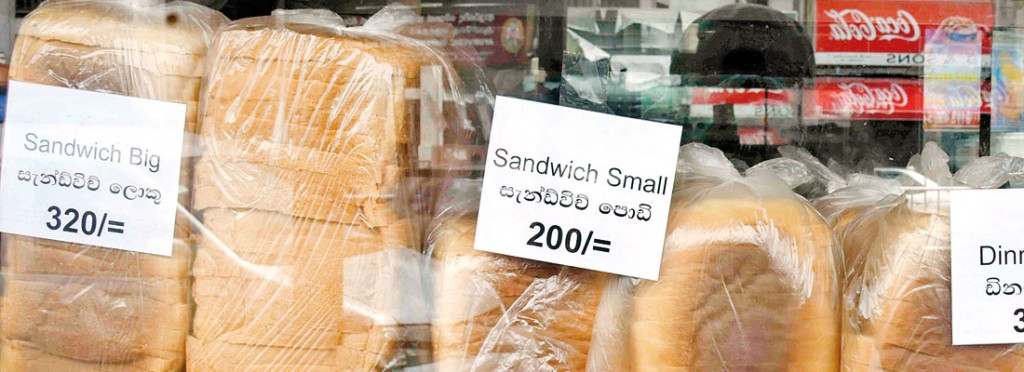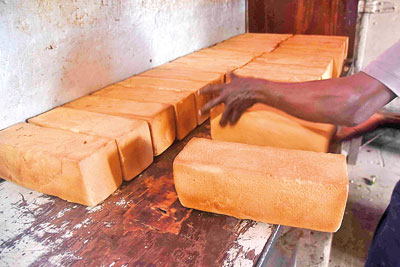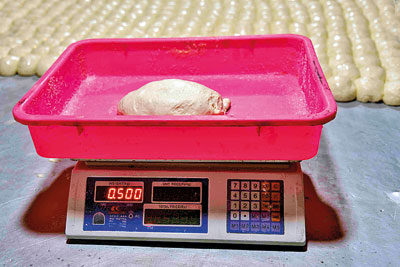News
Bread buyers turn their ire at lumps of flour
View(s):By Kasun Warakapitiya
Most bakeries in the city of Colombo are producing poor quality bread, which also weighs less.
Consumers complain that bread has the consistency of a paste or raw dough. The main reason for this is that bakers use low quality flour and baking ingredients.
Loaves are not fully baked due to lack of firewood, while some bakers cut electricity use by shutting down their electric ovens.
Many people have complained that bread weighs less than a pound and becomes stale quickly. 
A resident of Kolonnawa, Barbara Anthony, 56, has stopped buying bread. “The bread looks more fluffed up, it weighs less, and it does not taste good.
Ms Anthony said she is a former employee of a cleaning company and can’t afford Rs 150 daily for a loaf of bread.
Colombo resident, Charith de Silva said the bread tastes bad — almost raw in the middle but crisp outside. “What has happened to the usual loaf of bread? Bakers have forgotten how to bake. They only know to raise price but the quality keeps dropping.’’
P. Senarath, a retired state official, said there is no regulator to check the quality of bakery products.
He said bakers must ensure hygiene, taste, texture and correct weight. Even in the sliced bread sold in supermarkets, mould grows.
Wattala resident, J. Perera said that even the sandwich bread available in supermarkets become stale rapidly before the expiry date.
“There was mould growing on the sliced sandwich bread I bought last night, there are two more days for it to expire,” he said.
Jagath Priyantha Mudalige said most small retailers sell bread above Rs 150, but they weigh less. “I buy bread when I return from work. I am already tired when I reach the bakery on my way home and I can’t bother arguing with the baker. So I buy without checking the weight.’’

The laws governing bakery products are archaic and as old as 160 years. In the British times a law known as the Bread Ordinance was in place to ensure the quality of bread. Pix by Akila Jayawardena
The Bakery Owners Association admits quality issues.
Association president, N.K Jayawardena said fish buns are available for Rs 50 and for Rs 150, but the quality of the low-priced bun is inferior to the high-priced ones.
“I have to sadly say that some bakers actually reduce the weight of loaves of bread. As the association we urge shop owners to use a scale. And also the Consumer Affairs Authority should check,’’ he said.
Bakers say they use low quality ingredients due to high Government taxes on ingredients such as butter.
A kilo of imported butter is Rs 3,000 and the tax adds up to about Rs 2,000. So bakers use margarine.
Local dairy producers who are tax exempt, charge Rs 3,000 for their butter.
Maradana bakery owner Mohomad Ziyad, 32, said selling bread is challenging as bakers have to maintain a weight of 450g and also sell bread for Rs 150.
“To produce a 450g loaf of bread you have to use 510 grams of dough. It is not fair to tell us to sell bread for Rs 150. A 50 kilo bag of flour is Rs 11,000. So when we also count the wastage of flour, it is really difficult to make a profit by selling bread,” he said.
Owner of a well-known bakery at Slave Island, K Thilainathan said although premium flour is used, the bakery has switched to margarine.
He said the bakery is doing its best to ensure the correct weight and quality. Electricity costs have risen to Rs 60,000 and the bakery needs 300 litres of diesel a month. 
The laws governing bakery products are archaic and as old as 160 years. In the British times a law known as the Bread Ordinance was in place to ensure the quality of bread.
The 1864 Ordinance has provisions for the sale of bread by weight, and marking of the weight of loaves, offences relating to sale of bread, means of weighing to be provided by every baker or vendor of bread, the offence of adulteration of bread, the offence of adulterating corn, meal, or flour, provisions for search of bakers’ premises and seizure of adulterated flour, and punishment for persons in whose premises ingredients for adulteration is found.
The Ordinance was implemented through the magistracies, under their jurisdiction. The magistrate could authorise any police, or peace officer, or other person by warrant.
But there is no authority governed by the Ordinance to ensure the quality of bread.
The Consumer Affairs Authority spokesman said the regulator is not empowered to ensure the quality of bread. The CAA only acts against those selling above the maximum retail price of Rs 150.
The president of Public Health Inspectors Union, Upul Rohana said the Bread Ordinance is not implemented. No inspections are done.
Public health inspectors can take action against the adulteration of bread under Food Act of 1980, but that, too, does not have provisions for checking quality.
The best way to say that you found the home of your dreams is by finding it on Hitad.lk. We have listings for apartments for sale or rent in Sri Lanka, no matter what locale you're looking for! Whether you live in Colombo, Galle, Kandy, Matara, Jaffna and more - we've got them all!

